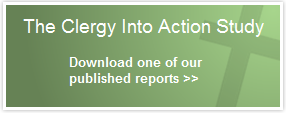Over the past 15 years, one of the major concerns that church leaders across Christian denominations have identified has been clergy health and wellness. Studies have shown that many Methodist pastors—like clergy in other denominations—are overweight or obese.1 Many Episcopal clergy struggle with depression and anxiety, as do clergy in other denominations.2 Other common issues include high levels of stress, relationship instability, and debt and financial problems.
The Presbyterian Church (USA) periodically asks its pastors some particularly helpful questions about health and wellness.3 These questions span the spiritual, financial, physical, emotional, and familial aspects of a healthy life. As part of the Clergy Into Action Study, we adapted some of these questions and asked recently ordained clergy to respond to them. This was, in many ways, the most personal part of our surveys. Here, we highlight the responses from clergy who participated in Transition into Ministry (TiM) programs.
The two charts below show how 347 TiM pastors and priests responded to our two sets of questions about physical, emotional, spiritual, financial, and relational wellness. First, we asked TiM clergy to rate the degree and direction of changes in their patterns of life in the last year. Then we asked them to rate their level of concern, satisfaction, or excitement about their current patterns of life.
TiM clergy indicated the most improvement in their significant relationships and in their financial health—nearly 50% reported that these areas of life had improved a little or a lot, and fewer than 20% reported that relationships or debt had gotten worse. Nearly 30%, however, indicated a decline in savings.
Over 35% also indicated modest to significant improvement in physical exercise, prayer life, and mood. But around 25% indicated modest to significant decline in prayer life and mood, and nearly 35% reported less frequent physical exercise. Not surprisingly, mood was strongly related to both exercise and prayer.
Physical exercise, rest, and overall weight were areas of increasing difficulty for over 30% of TiM alumni. Practices and disciplines of the body seem to be areas of difficulty for these well-trained clergy, as they are for clergy in general.
On a very positive note, TiM clergy were most excited about their current significant relationships. Over 40% were somewhat or very excited about their relational health; only 25% were somewhat or very concerned about their significant relationships.
In other areas, TiM alumni expressed higher concern and less excitement. The highest areas of concern—for more than 50%—were in their frequency of exercise, savings, weight, and prayer life.
Nearly 27% of TiM clergy expressed moderate or serious concern about four or more areas of wellness in their lives, and over 90% expressed concern about at least one area of wellness. Closer inspection reveals that over 32% indicated serious concern about one or more areas of wellness. But 50% of these same TiM clergy also expressed basic satisfaction to excitement about four or more areas of wellness in their lives—and two-thirds of them indicated moderate or high excitement about at least one area of wellness. About 8% expressed no satisfaction or excitement about any area of wellness.
For Your Consideration
- Where are you in relation to these different areas of wellness? How are you working on them, or not working on them? What do you find helps you the most in each area?
- How can faith communities, seminaries, and denominational leaders help clergy and students learn lifelong habits of wellness?
Related Article
1 Duke University’s Clergy Health Initiative, currently underway.
2 Anti-anxiety and anti-depressant medications are among the top ten medications prescribed for Episcopal clergy, according to a Church Insurance Company report, 2005.
3 For an example of the information gathered using these questions, see the report Spirituality and Health Findings from the January 2007 Survey, available online at http://www.pcusa.org/site_media/media/uploads/research/pdfs/0107sum.pdf .




